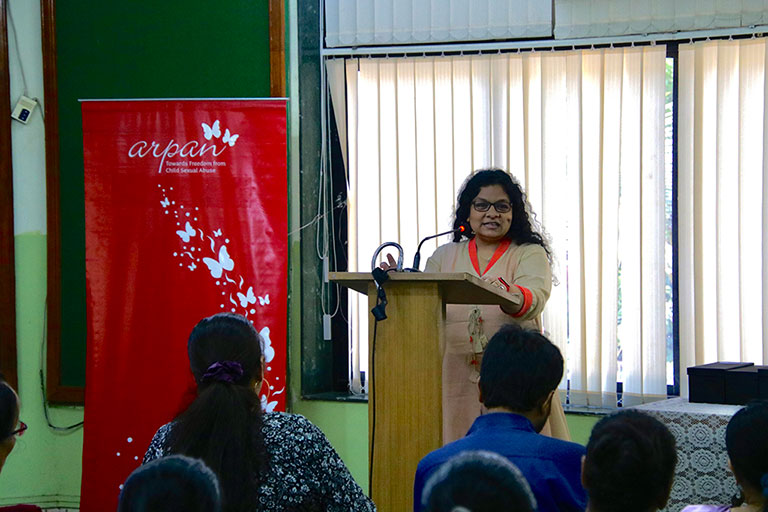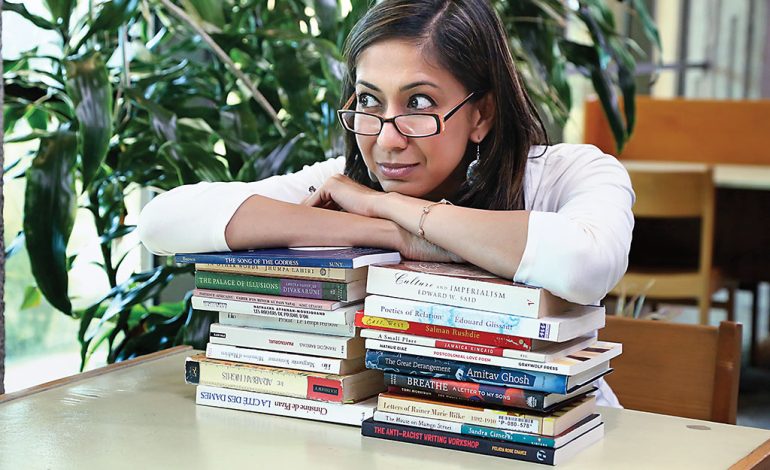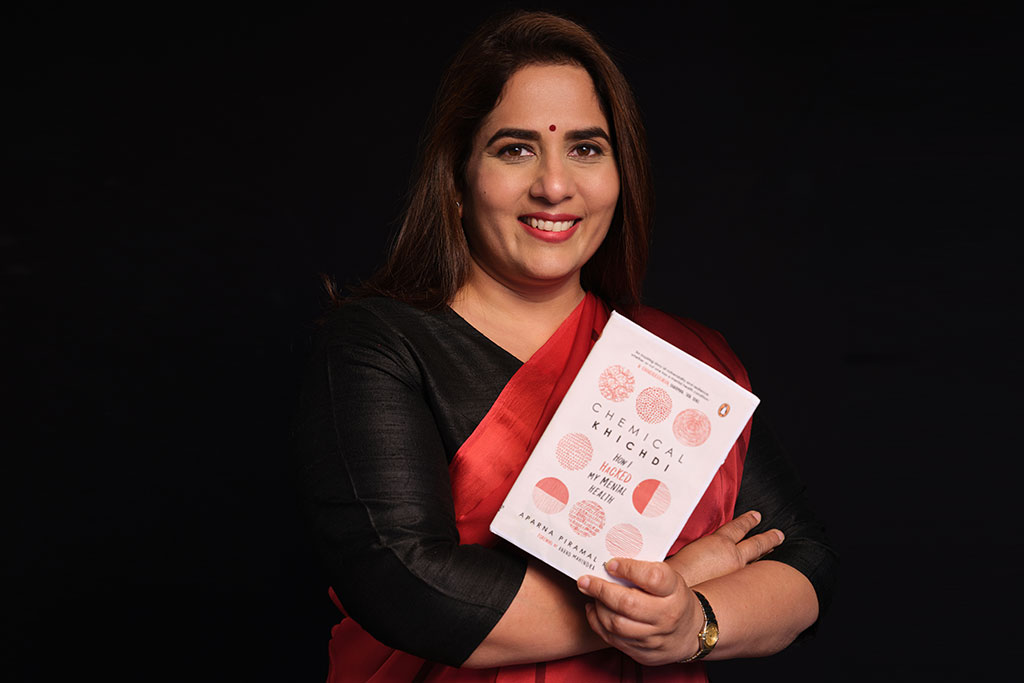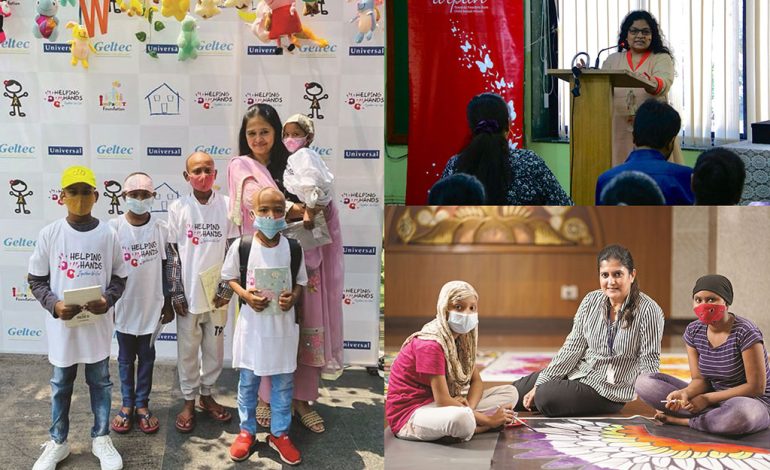
Women Of Hope
The way you get meaning into your life is to devote yourself to loving others, devote yourself to your community around you, and devote yourself to creating something that gives you purpose and meaning” — said Mitch Albom in his best-selling memoir of all-time, Tuesdays with Morrie.
Meet three self-motivated women who are the embodiment of selflessness, devotion and love. Here’s a closer look at their altruism initiative and the impact it is creating on social welfare. Born in Kolkata, Shalini Jatia was just six months old when her family moved to New Delhi. Coming from an affluent yet conservative business family, she got married when she was 18 years old. She then lived in Japan and other South- East Asian countries for a few years, and eventually moved to Mumbai. She had to discontinue college due to the travels, but eventually completed her Bachelor’s in Commerce from Mumbai University.
Shalini Jatia, Officer-In-Charge, ImpaCCt Foundation
The Joy of Giving
Altruism was a part of Jatia’s life from early on. “From early childhood, my life was an experiment with joys of a different kind—whether it was volunteering at a crèche in grade six, or at Mother Teresa’s home in Mumbai, with hundreds of disabled infants wanting to be held close,” she mentions. When her younger daughter Devanshi, turned five and started school, Jatia went back to her love for serving humanity.
In 2002, she began training at Breach Candy Hospital, Mumbai and started learning about counselling, patient care and medical aid. She also got an opportunity to work in the NGOs of key opinion leaders such as Rahul Bose (actor and philanthropist) and Priya Dutt (Ex-Member of Parliament). After having worked in patient care for more than five years, in 2007, she joined the mecca of her quest—the Paediatric Oncology Division of Tata Memorial Centre (TMC), Mumbai. Shalini Jatia has dedicated her life to the growth of ImPaCCT Foundation. Looking back at her journey she says, “When I joined TMC, the rate of abandonment was extremely high. Almost 700 children refused or abandoned treatment in the first few weeks. I conducted a sensitive survey to understand the reasons and also reached out to the families of the children who had refused/abandoned treatment between 2009 and 2011. Most of these children had died. The reasons that the parents shared were documented, through which came the establishment of ImPaCCT – an acronym for ‘Improving Paediatric Cancer Care and Treatment’. Over the years, the Foundation has supported more than 30,000 patients and raised donations of `300 crore. In the last six years, the rate of treatment refusal/abandonment has also reduced to as less as 3 per cent. The Foundation is now helping all the nineTMC centres across six Indian states.” A custom software technology was made through which every child coming to the hospital was closely tracked and supported, in terms of finance, accommodation, nutrition, transport, blood product, infection prevention, education, vocational training, enhanced counselling and lastly, bereavement support. She continues, “My work has now become a durable model for supporting children with cancer and their parents and is being replicated not only at all the TMC peripheral centres, but also by many other paediatric cancer units across India. The model can be easily replicated in other low- and middle income countries, too. The Foundation received an award from the International Society of Paediatric Oncology (SIOP) and its model was also published in Pediatric Blood and Cancer in 2019.”
Reaching Out
ImPaCCT Foundation serves cancerinflicted children from the extremely poor socio-economic stratum. The motivation in this stratum of society is low owing to poverty and lack of education. The Foundation ensures that every child coming to the TMC centres gets the best chance at cure. It is heartbreaking to learn that the mortality rates are quite high in some types of cancers. Jatia also provides bereavement counseling for families who lose their child to cancer. She ensures that the family takes treatment with complete dignity and that no parent ever goes away with the feeling that their child would have lived if they had money.
Over the years, the patients of pediatric cancers at TMC attended to by the Foundation, have become doctors, engineers, bankers, etc. This is her biggest victory.
Jatia’s Marwari upbringing and life have played a huge role in her journey. She admits that she has been able to do this service, thanks to her family’s support. They always believed in her work and encouraged her to give it her best. Her family’s connections have also helped her to get magnanimous donations for the Foundation. Jatia has been highly honoured owing to her stupendous work. She has had more than 10 publications in highly acclaimed medical journals. Personally, she believes that service can be done in the simplest of ways; all we need is some time and lots of passion. Her patients are her biggest motivational coach and each day at the Foundation is full of learnings and spirituality in action.
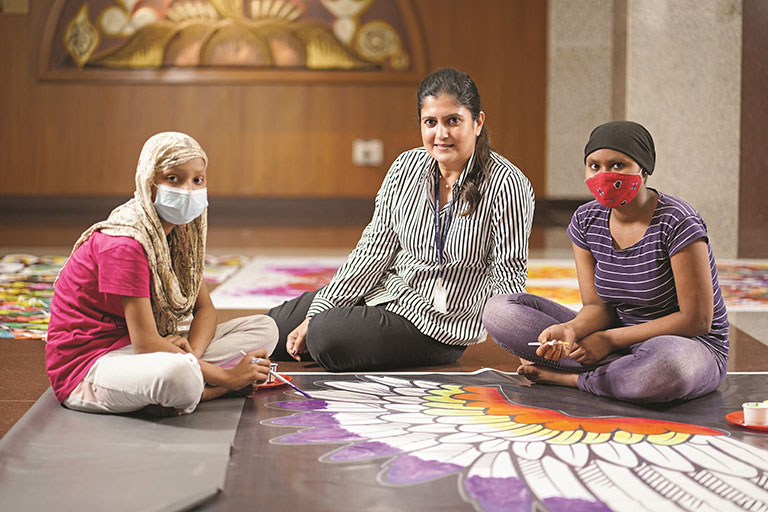
Madhavi Goenka, Founding Trustee, Helping Hands Foundation
Madhavi Goenka comes from a family of academics. While her mother, Asha Rani Gupta, has done her Master’s in Hindi literature, her father, Kishan Chand Gupta, worked as a chemical engineer in Ann Arbor, Michigan, USA. Born and raised in Mumbai, she comes from a business family and is married into one.
Hands That Help
Goenka’s mother has been working as a social worker for the past 40 years, and she and her younger sister have followed suit. “My parents didn’t differentiate between girls and boys. Before getting married, I studied interior designing at Sophia Polytech. After marriage and kids, I decided to study again. So, when I was pursuing fashion from SNDT, my kids and I were appearing for our individual exams simultaneously!” Goenka believes that education is important, but it is even more important to apply that knowledge.
Goenka is the Founding Trustee of Helping Hands Foundation, a nonprofit organisation that works to provide free accommodation to underprivileged paediatric cancer patients during their treatment at Tata Memorial Hospital, Mumbai. Helping Hands was started by her sons, Yashodhan and Krishna, as a CAS (Creativity, Activity, Service) project on leprosy awareness when they were studying at École Mondiale World School, Juhu, Mumbai. A chance visit to the hospital’s paediatric ward prompted Yashodhan to push her in this direction. She got the Foundation registered and started working for the society.
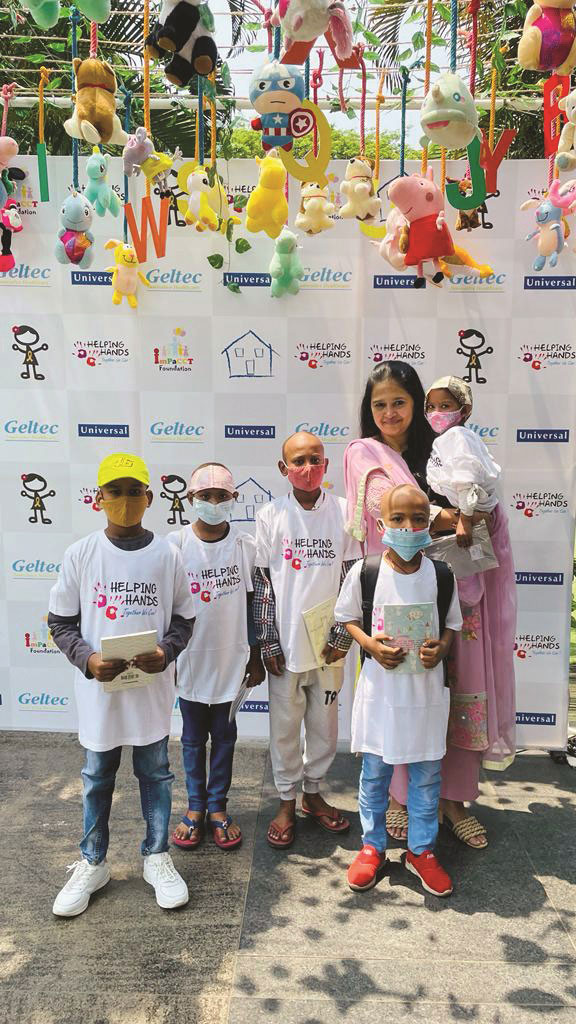
Tough Beginnings
“From fashion designing to selling NGO products, it was a difficult shift and also frustrating, at times. People thought it is a ‘bored housewife’ thing. I realised that most people didn’t understand that social workers work selflessly,” she shares. Currently, the three primary projects that Helping Hands works for are: The Accommodation Project, The Survivor Project, and The Emergency Project. Adopting The Accommodation Project for patients has been Goenka’s biggest challenge and learning. She aptly says, “Philanthropy teaches you not to have an ego and yet never let go of your self-respect. My personality and thought processes have changed for the better. To find my path at the age of 40 and to adopt it for life at 50—it is my biggest gift to myself.” Helping Hands started The Accommodation Project with two families and is helping almost 150 families every month now. She attributes this to the kindness of the donors. Her other challenge was to explain to the donors the importance of The Accommodation Project. People could not understand how people lived on the footpath orwhy they were homeless. Through The Survivor Project, the Foundation supports approximately 15 surgeries for prosthesis annually. It is the final step in the rehabilitation process of the cancer survivor. The Foundation now runs a full-fledged reward is seeing a mother’s face when the child goes home post-treatment. The accommodation facility not only saves lives, but marriages, too. Recently, two-year old Sambhavi went back home and the joy on her mom’s face will be a memory I will cherish.” One of Goenka’s most heart-warming experiences was when a girl, who was provided with a prosthetic Ottobock limb, wrote her a letter of gratitude post-surgery.
Attitude of Gratitude
Goenka feels blessed to have imbibed a culture that has given her the courage to follow this path. Her husband Manoj has been her greatest source of strength and without his unwavering support, she wouldn’t have been able to dedicate her life to philanthropy. “Being privileged, I have a voice. If I use it to help the less fortunate, then I am using my privilege effectively. I learnt it when we worked relentlessly during during COVID,” she admits. Three years ago, she also joined SVP India, which gave her a whole new view on things and broadened her horizons further. The Helping Hands Foundation is now raising funds for its flagship accommodation centre, and is welcoming donors to do their bit. It is the Foundation’s pilot project for families, who are below the poverty line, and come to Mumbai for cancer treatment.
Pooja Taparia, Founder & CEO, Arpan
Born and raised in Mumbai, Pooja Taparia has her roots in Nagaur, Rajasthan. She is the great-great-granddaughter of Shri Jagannathji Taparia, and is very proud of her lineage. The Taparia family is known to have been extremely entrepreneurial and philanthropic for more than a century. She studied at JB Petit High School for Girls and graduated in Applied Art/ Graphic Design from Sophia Polytechnic, and Commerce and Economics from Sydenham College.
Entrepreneurial Excellence
Taparia is the Founder-CEO of Arpan, a globally-recognised, award-winning NGO that works towards eliminating Child Sexual Abuse (CSA) in India. “Based in Mumbai, with a team of more than 100 dedicated professionals, Arpan is India’s most prominent NGO providing CSA Prevention and Intervention services for children and adults. It is a critical stakeholder for state and non-state actors, and uses advocacy and research to push for policy and systemic change at the local, state, and national levels.” As a leader, Taparia embodies the spirit of the modern-day social entrepreneur. She has grown Arpan from a three-person startup into a global thought-leader in the CSA space, with innovative impact models that work with a range of stakeholders— from children and parents to state bodies and teachers.
Arpan’s key project focuses on personal safety education in schools, teaching children and adolescents (aged between 4 and 16 years) about personal safety, so that they can identify and seek help in unsafe situations, and provides counselling to children (who have been abused) to help heal from its impact. Arpan also trains and empowers teachers and parents with the knowledge, attitude, and skills needed to prevent and deal with CSA.
